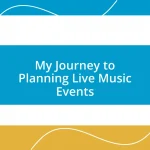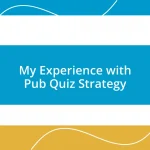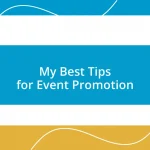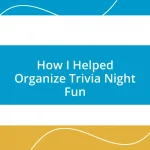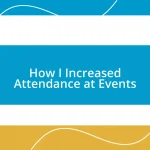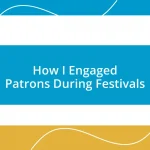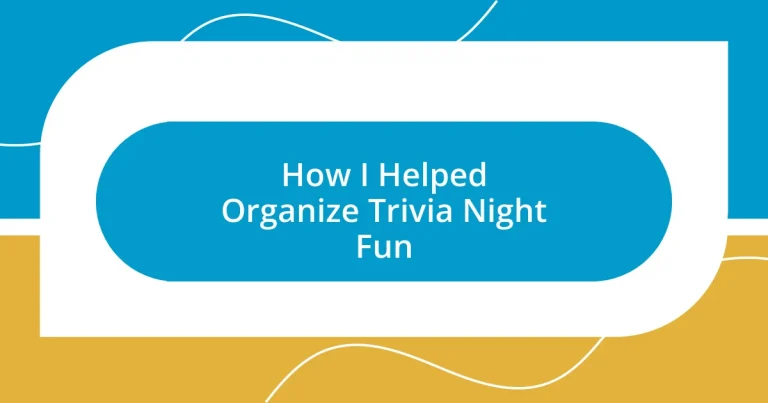Key takeaways:
- Creating an inviting atmosphere and selecting an appropriate venue enhances participant enjoyment and engagement during trivia nights.
- Designing diverse and fun trivia questions, along with balanced team formations, fosters camaraderie and keeps the competition lively.
- Promoting the event effectively through social media, email invitations, and gathering feedback post-event helps improve future trivia nights and builds community interest.
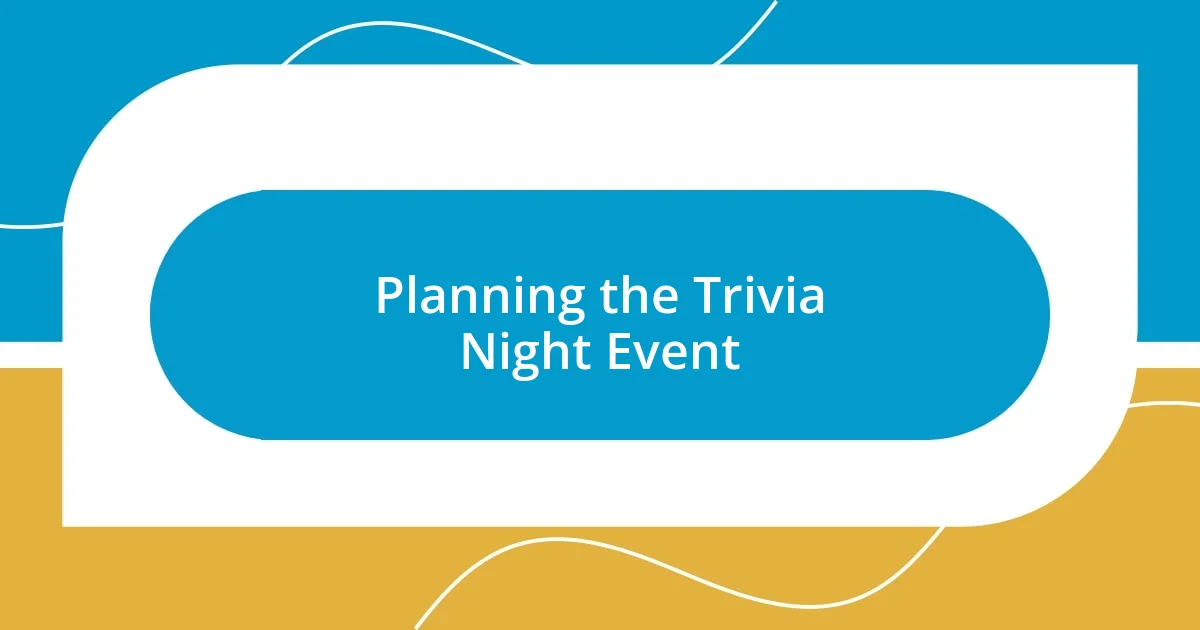
Planning the Trivia Night Event
Planning a trivia night requires more than just fun questions; it’s all about creating an inviting atmosphere. I remember the first time I organized one—it was in my small community center, and I felt that rush of excitement mixed with a hint of anxiety. What if no one showed up? To set the right vibe, I decorated the space with quirky signs and laughter-inducing props, instantly making folks feel welcome and ready for a good time.
Finding the right questions is crucial too. I started with categories that sparked my own interest—pop culture, history, and even a little science. As I crafted the questions, I thought, “Would I enjoy answering these?” This personal reflection helped me gauge the level of challenge; I wanted trivia that entertained but also got the competitive spirit up! Each question became a story, leading to memorable conversations throughout the night.
Timing is another important aspect I learned the hard way. In my first event, we ran over time, and people started losing interest. I quickly adapted by creating a flexible schedule that kept the energy up and the fun flowing. Have you ever felt that moment when a room buzzes with excitement? It’s magical. Keeping the tempo lively truly enhances the experience, turning a simple trivia night into an unforgettable evening.
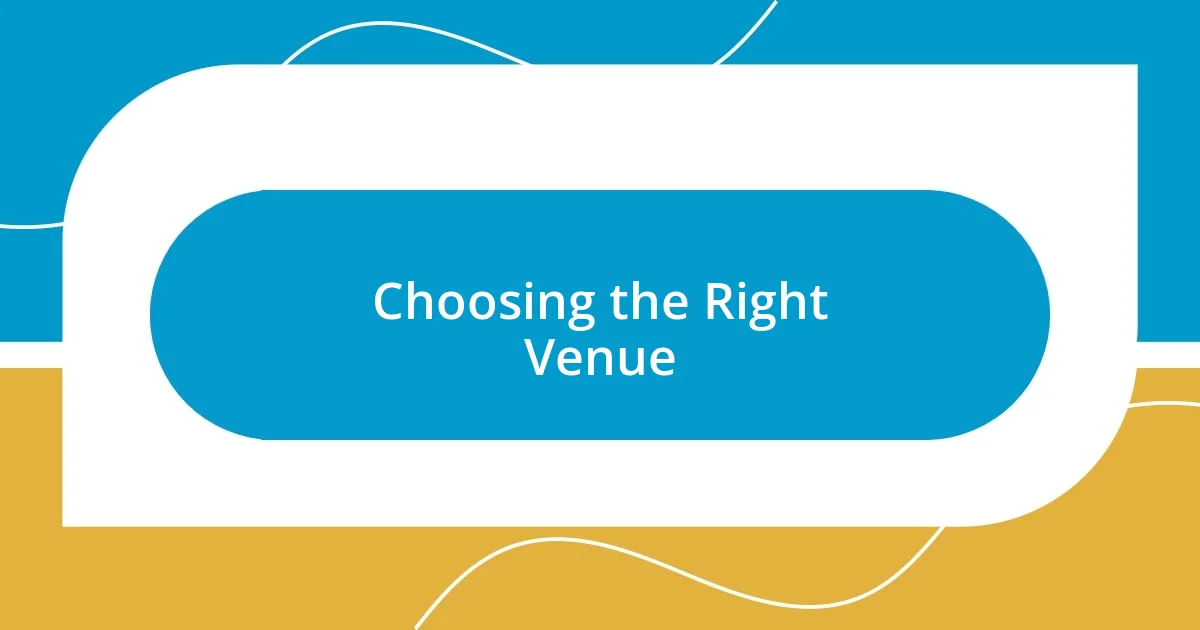
Choosing the Right Venue
Choosing the right venue can make or break your trivia night. During my early attempts, I booked a bustling pub, only to realize the background noise drowned out the questions. It was tough to gauge if anyone was having fun when all I could see were heads bobbing—but I learned! Since then, I’ve focused on places that offer a more intimate setting where laughter and concentration can coexist. A quiet yet lively venue truly sets the stage for connection and enjoyment.
Finding an appropriate space also involves considering the capacity and layout. I remember an event where I miscalculated attendance, and almost doubled in size! The cozy café became overloaded, pushing the energy past excitement into chaos. Instead, I stick to venues that have flexible arrangements and ample space for participants to mingle, and relax. It’s crucial to ensure that everyone feels comfortable as they dive into the trivia fun!
Another essential factor is accessibility. I often think back to the night I hosted at an inaccessible location—it was disheartening to learn that a few attendees had to miss out due to transportation issues. Now, I prioritize venues that are easy to reach, with enough parking or public transport options nearby. Truly, a good venue isn’t just about ambiance; it’s about making everyone feel included and valued!
| Venue Type | Pros |
|---|---|
| Cozy Café | Intimate atmosphere, easy to manage noise levels. |
| Community Center | Affordability and space flexibility. |
| Pubs/Bars | Fun vibe, but noise can be overwhelming. |
| Outdoor Spaces | Fun ambiance, but weather dependent. |
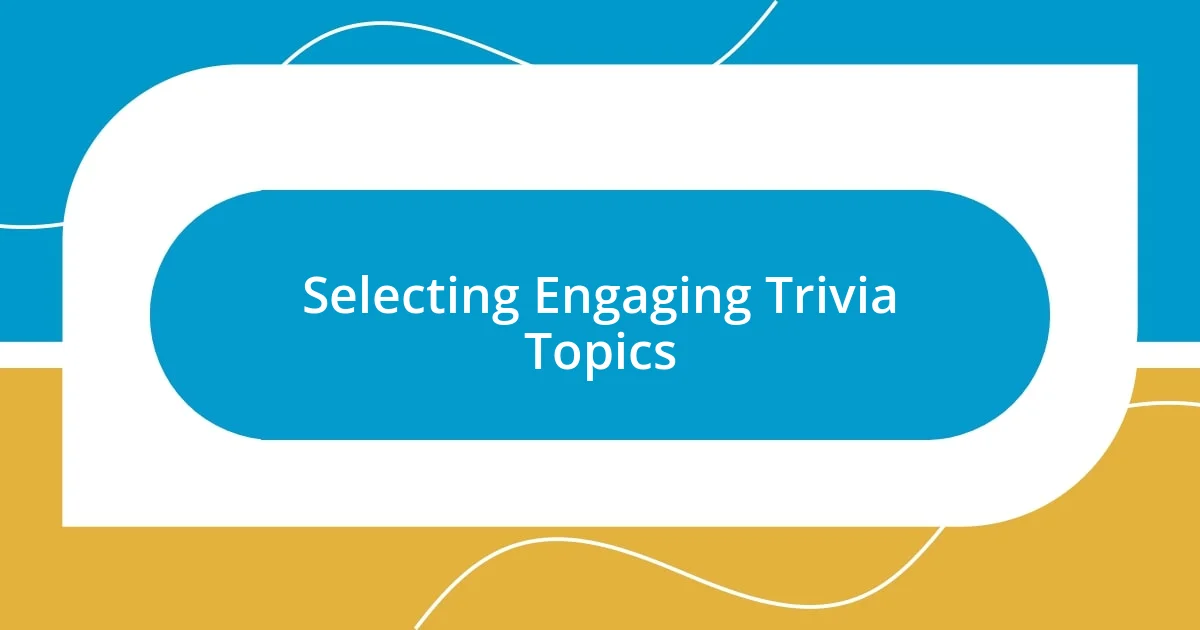
Selecting Engaging Trivia Topics
Selecting engaging trivia topics truly transforms the experience for everyone involved. When I brainstormed for my trivia nights, I usually envisioned what would excite me as a participant. I once organized a trivia night centered around nostalgic 90s TV shows, and the energy in the room was electric! People relished the chance to reminisce and share their favorite moments, which sparked laughter and camaraderie. The right mix of topics not only tests knowledge but also ignites memorable conversations and shared experiences.
To strike the perfect balance, I recommend including diverse categories that cater to a wide audience. Here’s a handy list of themes that tend to resonate:
- Pop Culture: Movies, music, and celebrities that everyone loves.
- History: Fascinating events or figures that can surprise the crowd.
- Science and Nature: Fun facts that challenge and educate.
- Local Trivia: Questions about the area to foster community pride.
- Food and Drink: Playful queries about cuisine and beverages that spark delicious debates.
By incorporating these themes, I found that trivia nights became more than just games; they turned into memorable gatherings where attendees bonded over shared knowledge and laughter. You get that warm feeling when the crowd genuinely enjoys themselves, and it’s rewarding to know you played a part in creating that joy.
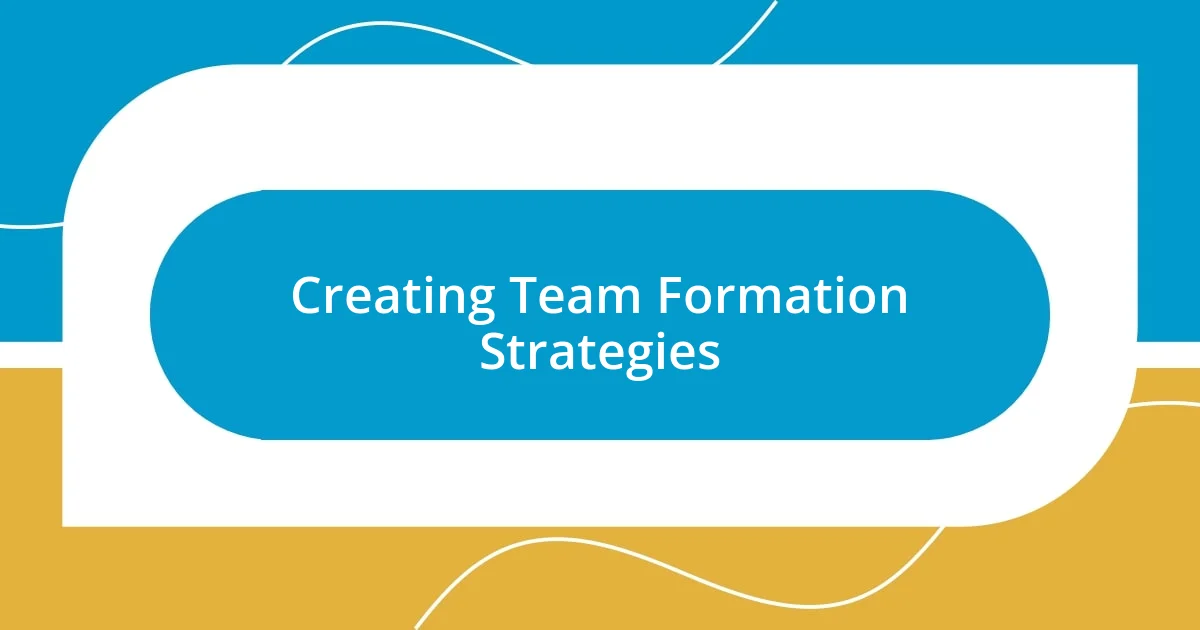
Creating Team Formation Strategies
Creating balanced teams is crucial for a successful trivia night. I remember when I made the mistake of letting all the competitive friends group together, while the more casual players formed their own team. The outcome? It felt one-sided and honestly, a bit awkward. Now, I opt for a mix-and-match approach. I shuffle participants randomly, ensuring teams blend different skill levels and knowledge backgrounds. It’s amazing how much more lively the banter gets when everyone feels they have a fair chance!
I also learned that considering team dynamics can make a big impact. During one event, I had a couple of friends who were overly confident, naturally gravitating towards a group of newbies. Instead of letting that happen, I encouraged them to join other teams, which made for more engaging discussions and fewer frustrations. Isn’t it great when everyone gets to share their insights rather than just one loud voice ruling the night?
Another strategy that I found effective is themed team names. I recall one night when participants were asked to get creative, leading to names like “Quiztopher Columbus” and “Trivia Newton John.” Laughter erupted, and it really set a fun tone for the evening. Team spirit can be elevated simply by asking people to embrace their personalities in such ways. It’s these little touches that can transform trivia night into a memorable experience that everyone looks forward to!
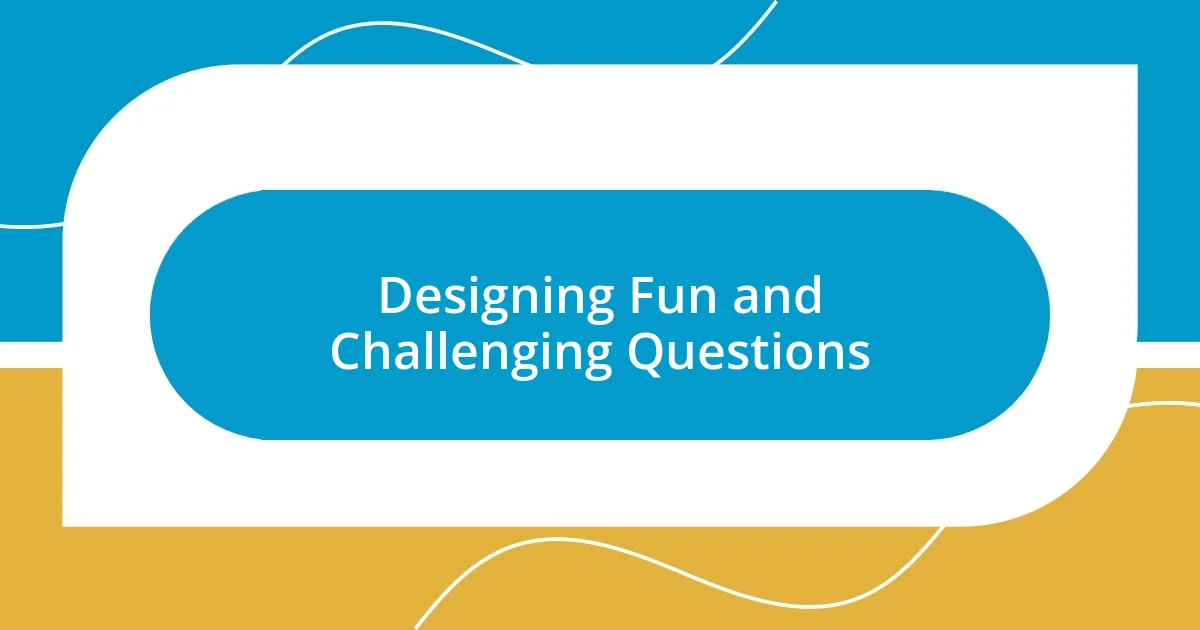
Designing Fun and Challenging Questions
Designing fun and challenging trivia questions is an art that can significantly elevate the mood of the night. I remember crafting a mix of questions that not only tested knowledge but also sparked joy. For instance, I once posed a quirky question about a famous movie quote. The moment someone shouted, “You can’t handle the truth!” the atmosphere lit up with laughter and playful debate. I’ve found that the excitement of solving these puzzles really brings groups together.
To make the questions engaging, I often weave in little nuggets of surprise. It’s thrilling when a question seems straightforward but then twists into something unexpected. I crafted a segment based on unusual animal facts. Who knew that octopuses have three hearts? This blend of fun and challenge keeps everyone on their toes, and I can see the collective “a-ha!” moment when someone figures out a tricky one. This sense of shared achievement is what makes trivia night truly unforgettable.
Additionally, I like to encourage participants to think outside the box. I’ve introduced “guess the song from the emoji” rounds that lead to animated discussions and laughter as teams decipher what a series of emojis represent. These moments create a fun, relaxed vibe where everyone feels included, regardless of their trivia prowess. Doesn’t it feel great when a simple question can evoke such camaraderie and excitement? I believe that’s the magic of well-designed trivia questions.
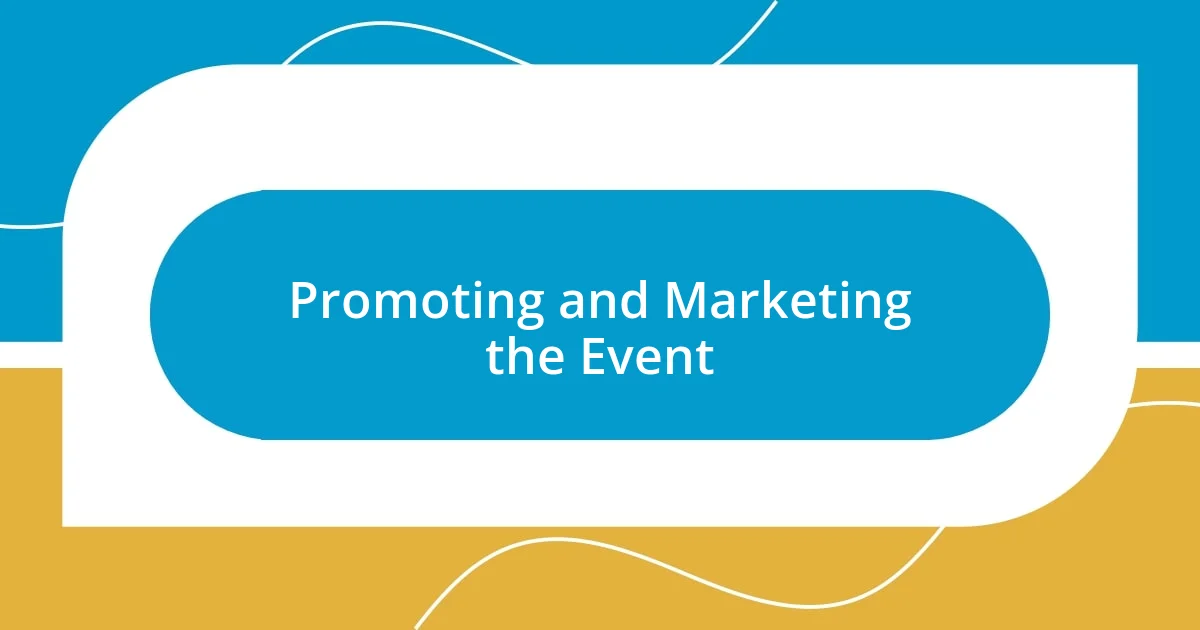
Promoting and Marketing the Event
Promoting your trivia night is essential for ensuring a lively turnout. I discovered the impact of social media first-hand when I created a dedicated event page and started sharing sneak peeks of some fun questions. Each teaser sparked curiosity and excitement among my friends, leading to shares and enthusiastic RSVPs. Have you noticed how a little online buzz can turn an ordinary gathering into something everyone feels compelled to join?
Email invitations are another game-changer. I once crafted a catchy subject line, “Think You’re Smarter Than Your Friends? Prove It at Trivia Night!” The responses were immediate; people love a little friendly competition! I also included quirky graphics that matched our trivia theme, highlighting the fun atmosphere I aimed to create. It’s amazing how visuals can enhance engagement and make your event feel more inviting.
Lastly, don’t underestimate the power of word-of-mouth. After one successful trivia night, I made it a point to gather testimonials from participants. I shared their joyous experiences on platforms like Instagram, which created a ripple effect. Authentic stories resonate with potential guests and encourage them to join in on future events. Have you ever found yourself drawn to something just because friends talked about it enthusiastically? That’s the kind of momentum you want to create!
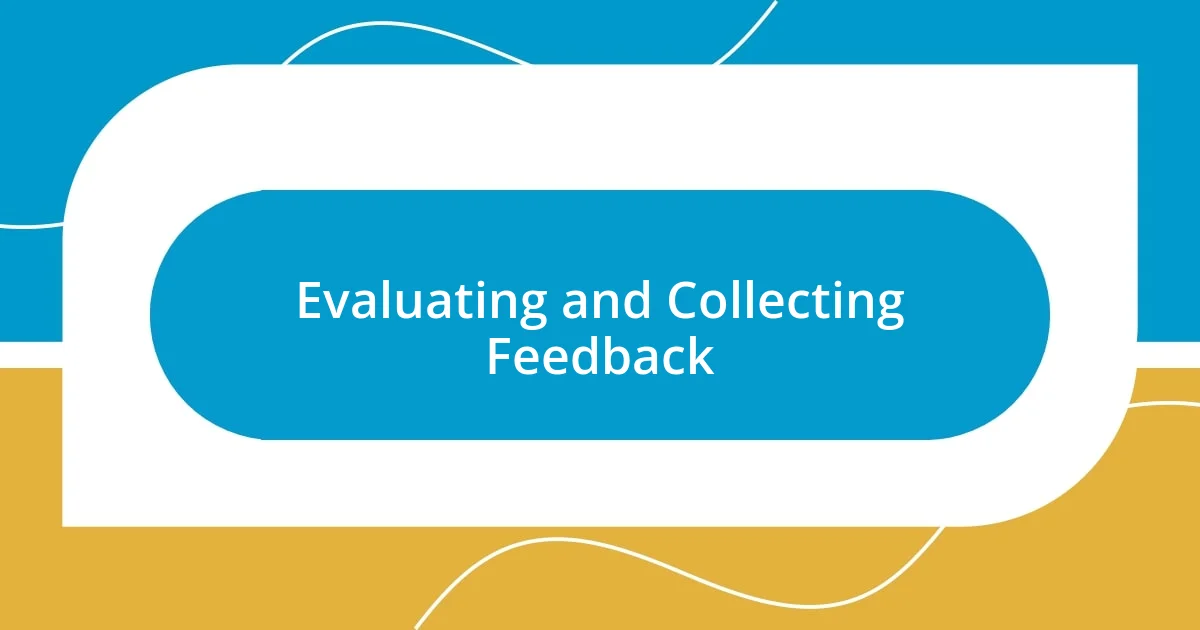
Evaluating and Collecting Feedback
Evaluating and collecting feedback is a vital step that shouldn’t be overlooked after hosting a trivia night. I remember feeling a mix of excitement and nerves as I passed out short feedback forms at the end of the event. It amazed me how eager people were to share their thoughts. Questions like, “What was your favorite round?” or “How could we improve the experience?” invited honest responses that shaped my future events.
Once I reviewed the feedback, I was pleasantly surprised by some of the insights. For example, a handful of participants mentioned they loved the creativity of the emoji song round, prompting me to include similar elements in subsequent trivia nights. It’s fascinating what people remember and enjoy! Isn’t it rewarding to see what resonates with others? This input not only boosts my confidence but also encourages a sense of community, knowing I’m curating a night everyone can look forward to.
Incorporating feedback doesn’t end with just reading it; I also find it essential to share the results with my team and consider the suggestions that pop up regularly. After all, valuing participants’ voices builds trust and enthusiasm for future trivia nights. Have you experienced the power of open communication? I know I have—and each event keeps getting better because of it.

